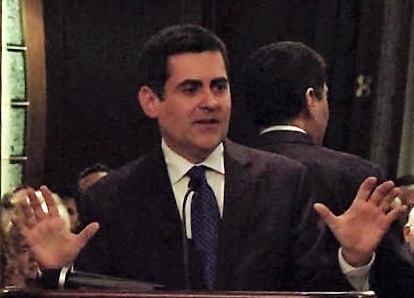By Bob Allen
Pastors today who refuse to speak on behalf of the unborn are no better than 19th-century congregations that stayed silent on slavery, the Southern Baptist Convention’s top spokesman on public policy and religious liberty concerns said in a lecture Oct. 14 in Washington.
Russell Moore, president of the SBC Ethics and Religious Liberty Commission, warned against the temptation to avoid what might be criticized as “political” issues in the fifth annual Dianne Knippers Lecture sponsored by the Institute on Religion and Democracy.
 “The churches in 1845 Georgia that did not speak to slavery were speaking to slavery,” Moore said. “If you stand in the pulpit and call people to repentance for drunkenness and sexual immorality but you do not call them to repentance for man-stealing and kidnapping and pretending to own another human being, then you have spoken to that issue by saying that that will not be something for which one must give an account at the Judgment Seat.”
“The churches in 1845 Georgia that did not speak to slavery were speaking to slavery,” Moore said. “If you stand in the pulpit and call people to repentance for drunkenness and sexual immorality but you do not call them to repentance for man-stealing and kidnapping and pretending to own another human being, then you have spoken to that issue by saying that that will not be something for which one must give an account at the Judgment Seat.”
Moore said the same is true of churches in 1925 Mississippi that preached about issues of private morality but not the public issue of the lynching of African-Americans. “They were baptizing the status quo by not calling people to repentance for a grave sin against God and against neighbor,” Moore said.
“And the churches in 21st-century America that do not speak to the personhood of the unborn are speaking to the personhood of the unborn by baptizing the status quo and leaving consciences that are wounded and in need of gospel liberation exactly where they are, under accusation, rather than freeing them with a witness that speaks to an issue that is thought to be political,” he said.
The lecture series is named for Dianne Knippers, longtime president of the Institute on Religion and Democracy, a Christian think tank founded in 1981 to counter liberalism in mainline Protestant churches and promote conservative values in public life. The religious strategist and Episcopal laywoman died in 2005 from cancer at age 53.
Moore, who knew Knippers personally, made light of all the talk in media that evangelicals are supposedly drifting leftward on issues such as same-sex marriage.
“I will constantly have secular journalists call and say, ‘What do you think about all of the evangelical churches that are caving on issues?’” he said. “I’ve become so exasperated by that question that I’ve started saying, ‘Name me the congregations.’”
“They will normally name me two congregations that have been in the news, one that is widely reported as a megachurch that is situated about a mile from where I live,” he continued. “It’s a church of about 600 people, which is not a megachurch. It is certainly not a megachurch in Nashville, Tennessee. So I have had to say, ‘That is actually the fourth largest church on that block, but give me another example.’ So there will be two or three, and my response is always to say, ‘There are more points of Calvinism than evangelical churches that you have given to me right now.’”
Moore said the arguments happening today over issues of human sexuality are not really about human sexuality but rather “issues of apostolic authority.”
“The question is not, ‘What does the Bible say on issues of gender and sexuality?’” he said. “The question is whether or not the apostle Paul was wrong because he did not have the same understanding of sexual orientation or other matters that contemporary people have.”
Moore said that is precisely the issue that Paul was addressing in his letters to the early churches: “Is the Spirit of Christ speaking through him or not?”
“In more recent days a self-proclaimed young evangelical has suggested that Jesus himself was wrong on issues of the definition of marriage, because Jesus did not understand what we as 21st-century people understand about marriage and gender identity,” Moore said. “It takes quite a messiah complex to school the actual Messiah on what he did not know about sexuality and the creation order.”
“These are not debates about the interpretation of Scripture,” Moore said. “They are claims to apostolic authority. We are speaking with an authority that trumps the received authority that has been given to the church.”
